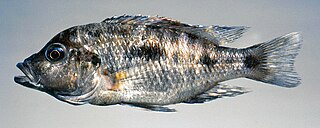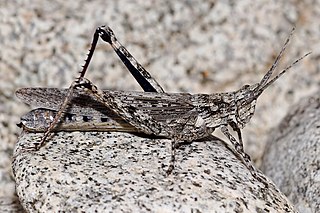
The American water shrew or northern water shrew, is found in the nearctic faunal region located throughout the mountain ranges of northern United States and in Canada and Alaska.
Dyacopterus is a genus of megabats from south-east Asia. It contains three species, namely:

The Encyclopedia of Life (EOL) is a free, online collaborative encyclopedia intended to document all of the 1.9 million living species known to science. It is compiled from existing databases and from contributions by experts and non-experts throughout the world. It aims to build one "infinitely expandable" page for each species, including video, sound, images, graphics, as well as text. In addition, the Encyclopedia incorporates content from the Biodiversity Heritage Library, which digitizes millions of pages of printed literature from the world's major natural history libraries. The project was initially backed by a US$50 million funding commitment, led by the MacArthur Foundation and the Sloan Foundation, who provided US$20 million and US$5 million, respectively. The additional US$25 million came from five cornerstone institutions—the Field Museum, Harvard University, the Marine Biological Laboratory, the Missouri Botanical Garden, and the Smithsonian Institution. The project was initially led by Jim Edwards and the development team by David Patterson. Today, participating institutions and individual donors continue to support EOL through financial contributions.

Delany's mouse or Delany's swamp mouse is a species of rodent in the family Nesomyidae. It is the only species in the genus Delanymys and the only extant member of subfamily Delanymyinae, which also contains the fossil genus Stenodontomys. It was previously placed in subfamily Petromyscinae, but it is apparently not closely related to Petromyscus. It is found in Democratic Republic of the Congo, Rwanda, and Uganda. Its natural habitats are subtropical or tropical high-altitude shrubland and swamps. It is threatened by habitat loss.

Otopharynx brooksi is a species of cichlid endemic to Lake Malawi. This species can reach a length of 15 centimetres (5.9 in) TL. This species can also be found in the aquarium trade. The specific name of this fish honours John Langdon Brooks (1920-2000), an evolutionary biologist at Yale University.

The Brooks’s dyak fruit bat is a species of megabat in the family Pteropodidae endemic to Sumatra. It was formerly included as a subspecies of Dyacopterus spadiceus. It is named for Cecil Joslin Brooks, who collected the type specimen near Bencoolen and presented it to Oldfield Thomas.
Chrysoritis brooksi, the Brook's opal, is a butterfly of the family Lycaenidae found only in South Africa.
Hurleyella is a genus of flies in the family Dolichopodidae from the Nearctic and Neotropical realms. Subfamily placement of this genus is currently uncertain, though in some aspects the genus fits into Medeterinae. The genus is named after the late dipterist Richard Hurley.

Skinnera is an Ediacaran-aged fossil found in Australia. It was discovered by A.L. Halliday and M.M. Bruer near Mount Skinner in the locality of Anmatjere, in the Northern Territory of Australia some time before 1969. Mary Wade of the University of Adelaide originally formally described Skinnera as a medusa.

Xanthippus corallipes, the red-shanked grasshopper, is a species of band-winged grasshopper in the family Acrididae. It is found in Central America and North America.

Xanthippus is a genus of band-winged grasshoppers in the family Acrididae. There are about six described species in Xanthippus.
Labops is a genus of plant bugs in the family Miridae. There are about 13 described species in Labops.
Saccharosydne is a genus of delphacid planthoppers in the family Delphacidae. There are about nine described species in Saccharosydne.
Prokelisia is a genus of delphacid planthoppers in the family Delphacidae. There are about five described species in Prokelisia.
Parammoplanus is a genus of aphid wasps in the family Crabronidae. There are about 19 described species in Parammoplanus.
Andrena brooksi, the Brooks' andrena, is a species of mining bee in the family Andrenidae. It is found in North America.
Xanthippus aquilonius is a species of band-winged grasshopper in the family Acrididae. It is found in North America.

Sigmoria is a genus of flat-backed millipedes in the family Xystodesmidae. There are more than 40 described species in Sigmoria.
Xanthippus montanus, the sandhills band-wing grasshopper, is a species of band-winged grasshopper in the family Acrididae. It is found in North America.
Japanagromyza is a genus of leaf miner flies in the family Agromyzidae. There are more than 80 described species in Japanagromyza.








